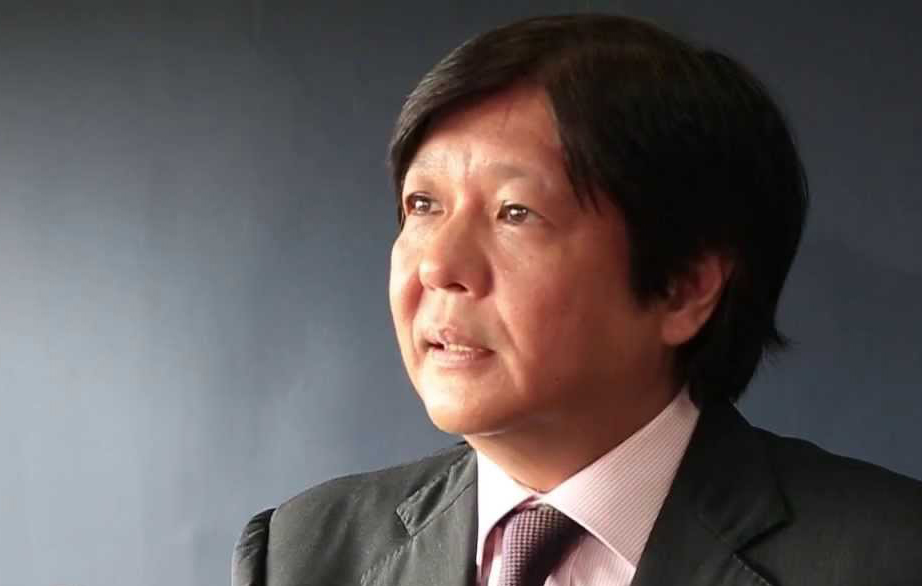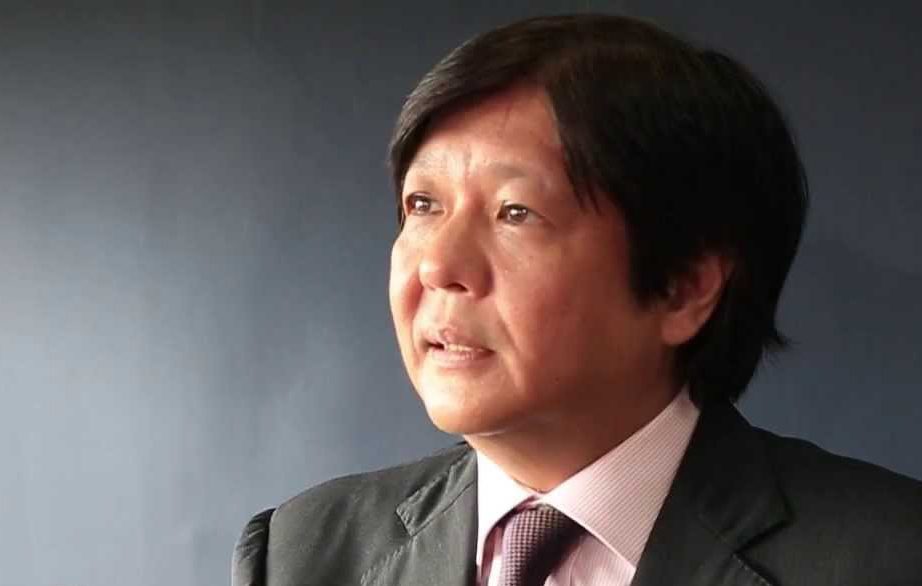
Ferdinand ‘Bongbong’ Marcos. Photo: YouTube
Cleve Arguelles looks at how a forgetful Philippines may return an authoritarian clan to the presidential palace.
They say that it takes a village to raise a child. But to raise a dictator’s son and groom him for national leadership? That takes a whole nation.
Ferdinand “Bongbong” Marcos Jr, son of former president and dictator Ferdinand Marcos Sr, is aiming for the vice-presidency in this year’s national elections. Thirty years after the popular uprising known as the People Power Revolution ousted the clan from the national seat of authority, the Marcoses are now gunning for one of the top two posts in the country.
Bongbong Marcos is currently a member of the Philippine Senate (a national elective post). His sister Imee Marcos is governor of the vote-rich province of Ilocos Norte, and mother Imelda Marcos is a member of the lower house of the Philippine Congress as representative of the same province.
In the latest polls, Bongbong Marcos is narrowly ahead, but has a clear lead in Metro Manila and with middle- to high-income voters. Why is the Philippine electorate now ready to elect the successor of the family that made their vast fortune through the pillage of the country? It’s because of the absence of an inclusive national collective memory of the Marcoses’ rule.
I grew up in a family of “loyalists”– a convenient category referring to a disparate, diverse group of Filipinos remaining loyal to the dictator Ferdinand Marcos and his family despite his ousting after the People Power Revolution. I learned about this part of our country’s history through the lens of a “loyalist family.”
My grandmother, a village councilor, has always supported the Marcoses. If asked about her choice for this year’s elections, she will readily share her “loyalist” vote: to elect Miriam Santiago, Bongbong’s running mate, as president and the dictator’s son as VP.
Miriam, she argues, is sick and will hand over the presidency to Bongbong as soon as she’s unable to serve. This, she thinks, is the Marcoses’ plan to return to Malacañang (the presidential palace).
And she wholeheartedly supports it. When confronted about the dark days of martial rule under Marcos and his family, she is quick to defend them: “My memory of the Marcos days were different. There was peace and order and our country was respected by others.”
In a big slum community in Quezon City, the Philippine’s most populous urban area, my “loyalist” grandmother’s claim resonates with other “loyalists.” Here, I am studying the voting behaviour and decisions of urban poor voters.
In many cases, I have encountered similar responses to questions on electing Bongbong as VP: “I want the Marcoses back in Malacañang,” or “I have a good memory of the rule of the Marcoses,” and so on. My attempts to offer a different version of the story are repeatedly dismissed.
It is one thing to be ignored by those who have witnessed and survived martial law. But it is definitely another thing to hear first-time voters, as young as 18, articulate the same claims as older generations. How does a Filipino millennial remember an episode in this nation’s history that they did not witness? And since the act of remembering is deeply political, how does a nation like ours struggle over memory, memorialising, remembering and forgetting?
The possibility that Bongbong Marcos, and by extension the Marcos dynasty, will be elected to the vice presidency this year reveals that memory is not only linked to the past, but also to the present and future. Acts of remembering are political practices that give meaning to the present and gain power over the future.
Another challenge is that those without memory of the Marcos period rely on institutions: schools, media, family, state. A grade school history textbook long used by both public and private schools has been found to contain “revisionist” versions about the martial law period, citing the “upliftment of Filipino lives” as the primary gains during the dictatorship. The history textbook is silent on the history of abuses, greed and violence perpetrated by the Marcos government. In issues of collective memory, silence is as crucial as remembering.
The media, on the other hand, is not silent. Regular annual programs are dedicated to the People Power Revolution. However, this memorialisation often centres only on Metro Manila as the symbol of national uprising against Marcos rule. The overthrow of the dictatorship was portrayed as an uprising that emerged and centered only on the metropolis.
Without representations from other areas, especially the margins, in the narrative of the defeat of the dictatorship, the official national memory excludes local memories of the same events. The Wall of Remembrance that was set-up to honour the martyrs and heroes who fought against the Marcos dictatorship illustrates the same problem: most of the names listed come from the national urban center, and are part of the professional class. Instead, decentering the memory of the revolution to include local and even contrary, disruptive memories, will create a more inclusive national collective memory and decrease the possibility of another Marcos presidency.
Another key factor is the return and persistence of ‘cacique democracy’ — a political system dominated by local bosses — in post-Marcos Philippines. Possibilities of political democratisation faced major backlash from powerful oligarchs.
The absence of a truth commission to set historical memories straight is also a factor – presenting the Marcoses and their allies with an opportunity to pull the people’s memory of the dictatorship in different directions. No post-Marcos administration has formally attempted to keep the memory of the injustices, human rights violations and corruption alive.
When Ferdinand Marcos died in 1989, chief of the board of censors Manoling Morato reprimanded the media for “demonising the Marcoses.” Historical truths were easily made fictional in the absence of complete prosecution of the actors involved: none of the Marcoses have ever faced imprisonment for their actions.
In reality, the Marcos clan is not “returning”, as others have noted, because they never really left. In the popular national imagination, we have maintained spaces for a fragmented memory of the Marcos rule, with the Marcoses themselves contesting official narratives to their advantage.
George Orwell once warned that the most effective way to destroy people is to deny and obliterate their own understanding of their history. Without control of our past, we surrender our political power. The absence of an inclusive national collective memory has made it possible for the Marcoses to reach the doorsteps of Malacañang once again.
The struggle over memory is far from over. We continue to decide what to remember and what to forget. But we must remember that what constitutes our national collective memory reveals who and what we are as a nation.
It takes a whole nation to remember, but also a whole nation to forget.
Cleve Kevin Robert V Arguelles is Instructor and Chair of the Political Science Program in the University of the Philippines Manila. His current research projects include the politics of memory in Filipino millennials, and remembering (and forgetting) the People Power Revolution. For more conversations, follow him on Twitter @clevearguelles.
 Facebook
Facebook  Twitter
Twitter  Soundcloud
Soundcloud  Youtube
Youtube  Rss
Rss 